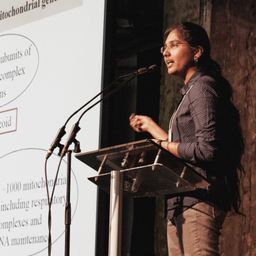Mitochondria-Derived Vesicles prevent inflammation by controlling the inclusion of mitochondrial proteins into extracellular vesicles
Mon statut pour la session
Mitochondria-Derived Vesicles prevent inflammation by controlling the inclusion of mitochondrial proteins into extracellular vesicles
Kiran Todkar1,2, Lilia Chikhi1,2, Véronique Desjardins1,2, Firas El-Mortada1,2, Geneviève Pépin1,2, Marc Germain1,2*
1Groupe
de Recherche en Signalisation Cellulaire and Département de Biologie Médicale,
Université du Québec à Trois-Rivières, Trois-Rivières, Quebec,Canada
2CERMO-FC
UQAM,Quebec,Canada
Most cells constitutively secrete mitochondrial DNA and proteins in extracellular vesicles (EVs), small vesicles that allow the transfer of material between cells. While under pro-inflammatory conditions, this mitochondrial content can further enhance inflammation, its role in the absence of inflammation remains elusive. Here, we demonstrate that mitochondrial components found in normal EVs are not pro-inflammatory and that cells actively prevent the packaging of pro-inflammatory, damaged mitochondrial proteins into EVs. Importantly, the distinction between material to be included into EVs and damaged mitochondrial content to be excluded was dependent on their selective targeting to one of two distinct Mitochondria-Derived Vesicles (MDVs) pathways, MDVs being small vesicles carrying material between mitochondria and other organelles. Sorting nexin 9 (Snx9)-dependent MDVs were required to target mitochondrial proteins into EVs, while the Parkinson’s disease related protein Parkin blocked this process by targeting damaged mitochondrial content to lysosomes. Our results thus provide important insight into the interplay between mitochondrial quality control mechanisms and mitochondria driven immune responses.





